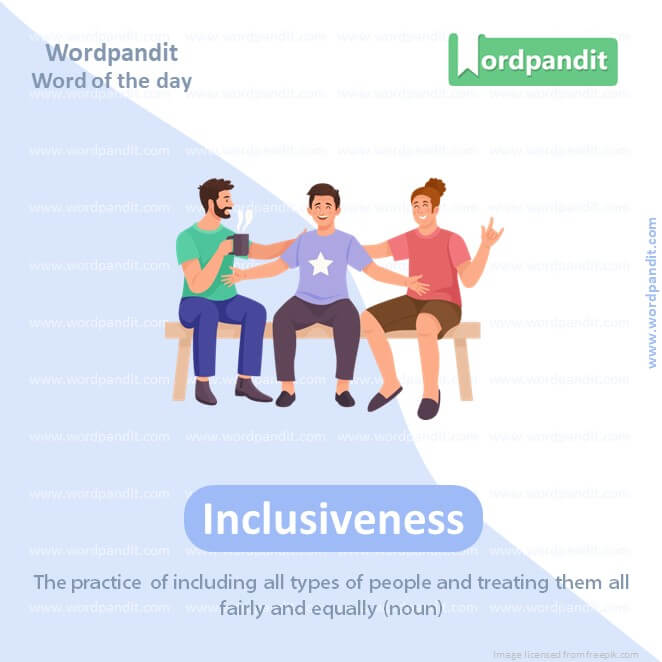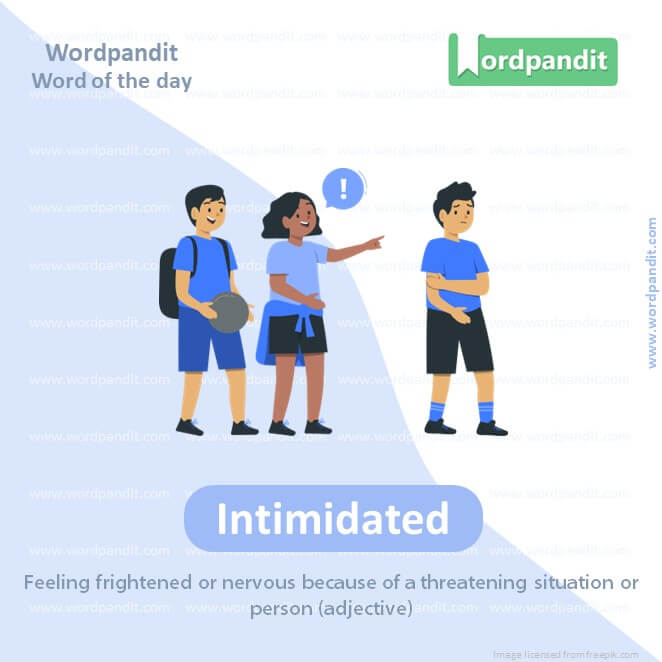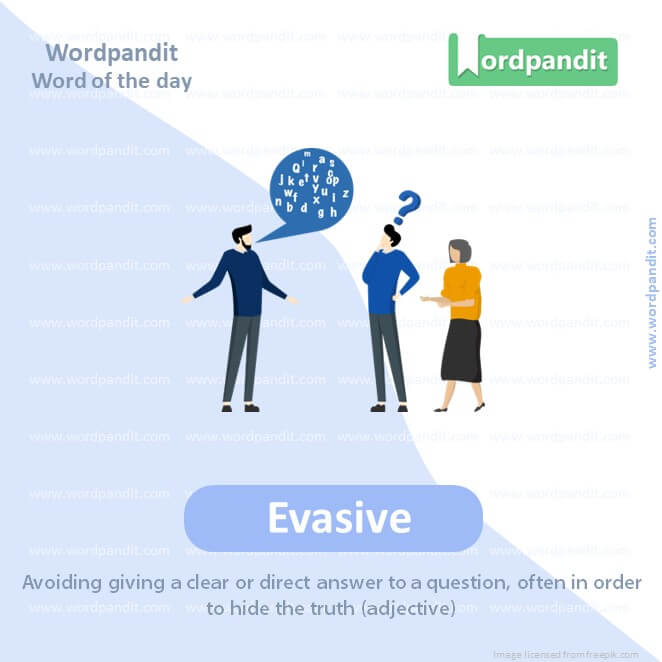Daily Vocabulary Words: List of Daily Used Words
Hi there. Welcome to this special section @ Wordpandit.
Our endeavour here is straightforward: highlighting important daily vocabulary words, you would encounter in The Hindu. This is your repository of commonly used words; essentially, we are posting a list of daily used words. Hence, this has significant practical application as it teaches you words that are commonly used in a leading publication such as The Hindu.
Visit the website daily to learn words from The Hindu.

WORD-1: Inclusiveness
CONTEXT: The intervention strategies for promoting inclusiveness and equities for different sets of people need to different.
SOURCE: The Hindu
EXPLANATORY PARAGRAPH: Imagine you’re having a party and you invite everyone in your class, so no one feels left out. That’s being inclusive. Inclusiveness means making sure everyone feels welcome and is included, no matter how different they are.
MEANING: The practice of including all types of people and treating them all fairly and equally (noun).
PRONUNCIATION: in-KLOO-siv-ness
SYNONYMS: Acceptance, Openness, Tolerance, Diversity, Equity, Welcoming, Unity
USAGE EXAMPLES:
1. The school’s inclusiveness policy ensures students from all backgrounds are treated equally.
2. A company’s inclusiveness can be seen in how diverse its staff is.
3. Inclusiveness in a team helps everyone feel valued and respected.
4. Celebrating different cultures at the festival is a great example of inclusiveness.

WORD-2: Incarcerate
CONTEXT: We coded the attacks on a scale where a high level of attack has occurred on organisations that have not only run out of funds but also whose leaders have either been sent to prison or have charges that can potentially incarcerate them.
SOURCE: The Hindu
EXPLANATORY PARAGRAPH: If someone does something really bad, like stealing, they might be put in jail. This is called incarcerating. It’s like a time-out for grown-ups, but it lasts longer and happens in jail.
MEANING: To put someone in prison as punishment for a crime (verb).
PRONUNCIATION: in-KAR-suh-rayt
SYNONYMS: Imprison, Jail, Lock up, Detain, Confine, Encage, Intern
USAGE EXAMPLES:
1. The judge decided to incarcerate the thief for six months.
2. After the trial, the criminal was incarcerated.
3. Laws are in place to incarcerate people who break them.
4. The new policy aims to incarcerate fewer people for minor offenses.

WORD-3: Intimidated
CONTEXT: Apart from the FCRA provisions, foreign donors are also intimidated by a Prior Reference Category List of around 80 internationally reputed donors who are monitored and intimidated for pursuing any human rights related causes.
SOURCE: The Hindu
EXPLANATORY PARAGRAPH: Imagine feeling scared to talk or act because someone is being really mean or strong. That’s feeling intimidated. It’s like being afraid to answer a question in class because you’re scared of getting it wrong.
MEANING: Feeling frightened or nervous because of a threatening situation or person (adjective).
PRONUNCIATION: in-TIM-i-day-tid
SYNONYMS: Frightened, Scared, Bullied, Daunted, Overawed, Terrified, Alarmed
USAGE EXAMPLES:
1. She felt intimidated by the bigger kids at the playground.
2. The loud noise in the dark alley left him feeling intimidated.
3. During the meeting, the new employees were intimidated by their boss’s strict rules.
4. Intimidated by the difficult test, the students were nervous.
WORD-4: Abrasive
CONTEXT: They provide answers that help us understand their motivations, opinions on controversial issues, and future plans, but sometimes they can be abrasive, evasive, or maintain a stony silence.
SOURCE: The Hindu
EXPLANATORY PARAGRAPH: If something is rough and can scratch, like sandpaper, it’s abrasive. It can also mean someone who speaks or acts in a harsh, unkind way, like saying mean things without caring about others’ feelings.
MEANING: Rough and harsh in texture, or being harsh and rude in behavior or speech (adjective).
PRONUNCIATION: uh-BRAY-siv
SYNONYMS: Harsh, Rough, Grating, Coarse, Scratchy, Rude, Crude
USAGE EXAMPLES:
1. The abrasive cleaner scratched the surface of the table.
2. His abrasive manner made it difficult to work with him.
3. The teacher’s abrasive comments upset the students.
4. Sandpaper is an abrasive material used in carpentry.

WORD-5: Evasive
CONTEXT: They provide answers that help us understand their motivations, opinions on controversial issues, and future plans, but sometimes they can be abrasive, evasive, or maintain a stony silence.
SOURCE: The Hindu
EXPLANATORY PARAGRAPH: When you don’t want to answer a question directly, like when asked if you ate the last cookie and you talk about something else instead, that’s being evasive. It’s like dodging the question or being a bit tricky.
MEANING: Avoiding giving a clear or direct answer to a question, often in order to hide the truth (adjective).
PRONUNCIATION: ih-VAY-siv
SYNONYMS: Elusive, Dodgy, Slippery, Vague, Shifty, Sneaky, Tricky
USAGE EXAMPLES:
1. The politician’s evasive answers frustrated the interviewers.
2. He gave an evasive reply to avoid telling the truth.
3. Her evasive behavior made her parents suspicious.
4. The witness was evasive during the questioning.
WORD-6: Iniquitous
CONTEXT: Not only has it impacted climate change but has also created spatial and temporal changes such as massive land use, building typologies, iniquitous cities, duality, informality, crisis of pollution, housing, water and sanitation challenges, and some of the most unequal city spaces.
SOURCE: The Hindu
EXPLANATORY PARAGRAPH: Iniquitous is like when someone does something very wrong and unfair, like cheating in a game. It’s a big word for being really unfair or bad.
MEANING: Extremely unfair, immoral, or wicked (adjective).
PRONUNCIATION: in-IK-wi-tus
SYNONYMS: Unjust, Wicked, Evil, Sinful, Corrupt, Immoral, Dishonest
USAGE EXAMPLES:
1. The iniquitous law was protested by many people.
2. His iniquitous behavior caused trouble for everyone.
3. The judge condemned the iniquitous actions of the criminal.
4. There was an iniquitous distribution of food in the camp.
WORD-7: Unravelling
CONTEXT: The Nehruvian period lasted for almost three decades and began unravelling in the late 1980s.
SOURCE: The Hindu
EXPLANATORY PARAGRAPH: Unravelling is like when a sweater gets a loose thread and it starts to come undone. It can also mean solving a mystery, like figuring out a puzzle.
MEANING: Coming apart or being solved, especially for complex situations or mysteries (verb).
PRONUNCIATION: un-RAV-uh-ling
SYNONYMS: Untangling, Solving, Unfolding, Clarifying, Disentangling, Resolving, Deciphering
USAGE EXAMPLES:
1. The mystery was unravelling as they found more clues.
2. Her knitting started unravelling when she dropped a stitch.
3. The plot of the story began unravelling towards the end.
4. The detective spent hours unravelling the complex case.
WORD-8: Prudent
CONTEXT: The concerns on debt sustainability can be construed as a call for more prudent management of debt in the medium term.
SOURCE: The Hindu
EXPLANATORY PARAGRAPH: Being prudent is like thinking carefully before you do something. It’s like looking both ways before you cross the street, so you stay safe. It means being smart and careful about your choices.
MEANING: Acting with or showing care and thought for the future (adjective).
PRONUNCIATION: PROO-dent
SYNONYMS: Wise, Careful, Cautious, Sensible, Judicious, Thoughtful, Discreet
USAGE EXAMPLES:
1. It is prudent to save money for emergencies.
2. The prudent student studied well in advance for the exam.
3. Making a budget is a prudent decision.
4. She made a prudent choice by avoiding the risky investment.
WORD-9: Devaluations
CONTEXT: The weight of debt can act as a drag on development due to limited access to financing, rising borrowing costs, currency devaluations, and sluggish growth.
SOURCE: The Hindu
EXPLANATORY PARAGRAPH: Devaluations is like when your piggy bank money becomes worth less than before. It’s like if you could buy ten candies with one dollar, but now you can only buy five. The value of the money went down.
MEANING: Reductions in the value of something, especially a country’s money (noun).
PRONUNCIATION: dee-val-yoo-AY-shuns
SYNONYMS: Depreciations, Downgrades, Reductions, Lowerings, Declines, Diminishments, Decreases
USAGE EXAMPLES:
1. The devaluations of the currency made imports more expensive.
2. Economic problems led to frequent devaluations of their money.
3. Devaluations can affect how much you can buy with your money.
4. The company faced devaluations in its stock value.

WORD-10: Sluggish
CONTEXT: The weight of debt can act as a drag on development due to limited access to financing, rising borrowing costs, currency devaluations, and sluggish growth.
SOURCE: The Hindu
EXPLANATORY PARAGRAPH: Sluggish is like feeling really slow and not having much energy, like how you feel when you’re really tired and don’t want to move. It’s like a turtle moving slowly.
MEANING: Lacking energy or moving slowly (adjective).
PRONUNCIATION: SLUHG-ish
SYNONYMS: Slow, Lethargic, Inactive, Lazy, Torpid, Sluggard, Drowsy
USAGE EXAMPLES:
1. He felt sluggish after eating a big lunch.
2. The sluggish computer was frustrating to use.
3. Her movements were sluggish in the early morning.
4. The economy was growing at a sluggish pace.
Vocabulary English Grammar
Delving into the vast universe of language learning, the ‘Vocabulary English Grammar’ acts as a beacon, illuminating the path to mastery. This synergy of words and rules forms the quintessential framework of the English language. However, understanding ‘Vocabulary English Grammar’ in-depth requires a fine-tuned strategy.
First and foremost, understanding ‘Vocabulary English Grammar’ goes beyond only remembering rules and words. It involves learning how a word functions in a grammatical context. To achieve this, resources like textbooks, online grammar guides, and interactive language learning apps prove to be very valuable.
However, embracing ‘Vocabulary English Grammar’ calls for consistent practice. Adopting thematic learning, where you concentrate on a specific grammatical concept and the vocabulary related to it, can be particularly effective. Reading material like articles and books, or engaging with podcasts and films can provide a real-world context to these concepts.
The key to mastering ‘Vocabulary English Grammar’ lies in constructing sentences. Instead of memorizing disconnected words and rules, start framing sentences. This active application significantly bolsters comprehension and provides practical insight into how grammatical rules govern the use of words.
To truly excel in ‘Vocabulary English Grammar’, it’s important to seek feedback. Participate in language exchange platforms or conversation clubs. These platforms provide an opportunity to apply what you’ve learned and obtain constructive feedback on your progress.
In essence, understanding ‘Vocabulary English Grammar’ is a step-by-step process that requires thoughtful learning, constant practice, application, and proactive feedback. By embedding these techniques into your language learning routine, you can confidently navigate ‘Vocabulary English Grammar’. Remember, mastering ‘Vocabulary English Grammar’ is not about perfection, but about progression and communication. Each rule learned, each word comprehended, brings you closer to the fluency in your English language journey.













